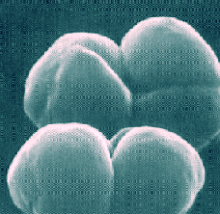This is an old revision of this page, as edited by Petri Krohn (talk | contribs) at 09:57, 7 February 2013 (+ Permian–Triassic extinction event + ref New Scientist). The present address (URL) is a permanent link to this revision, which may differ significantly from the current revision.
Revision as of 09:57, 7 February 2013 by Petri Krohn (talk | contribs) (+ Permian–Triassic extinction event + ref New Scientist)(diff) ← Previous revision | Latest revision (diff) | Newer revision → (diff)
| Methanosarcina | |
|---|---|

| |
| Methanosarcina barkeri fusaro | |
| Scientific classification | |
| Domain: | Archaea |
| Kingdom: | Euryarchaeota |
| Phylum: | Euryarchaeota |
| Class: | Methanomicrobia |
| Order: | Methanosarcinales |
| Family: | Methanosarcinaceae |
| Genus: | Methanosarcina |
| Binomial name | |
| Methanosarcina Kluyver and van Niel 1936 | |
| Species | |
Methanosarcina are the only known anaerobic methanogens to produce methane using all three known metabolic pathways for methanogenesis. Most methanogens make methane from carbon dioxide and hydrogen gas. Some others utilize acetate in the acetoclastic pathway. In addition to these two pathways, species of Methanosarcina can also metabolize methylated one-carbon compounds through methylotrophic methanogenesis. Such one-carbon compounds include methylamines, methanol, and methyl thiols. Thus species of Methanosarcina are the most diverse methanogens in terms of physiology. They are found in diverse environments, including trash dumps, sewage heaps, deep sea vents, deep subsurface groundwater, and even in the gut of many different ungulates, including cows, sheep, goats, and deer. Methanosarcina have even been found in the human digestive tract too. Methanosarcina are also unique in that they have been found to grow in colonies and even show primitive cellular differentiation. Both M. acetivorans and M. mazei have been found to have exceptionally large genomes. As of August 2008, M. acetivorans possessed the largest sequenced archaeal genome at 5,751,492 bp. Slightly smaller is the genome of M. mazei, with 4,096,345 bp.
It has been suggested, that Methanosarcina's newfound ability to produce methane was the cause of the Permian–Triassic extinction event.
References
- PMID 11932238
- Sara Reardon (14 December 2012). "Permian mass extinction triggered by humble microbe". New Scientist (2895).
External links
- Putting Life's Puzzle Together from Astrobiology Magazine (May 17, 2006)
- Methanosarcina from The Microbial Biorealm at Kenyon College
- Comparative Analysis of Methanosarcina Genomes (at DOE's IMG system)
- Methanosarcina Genome Projects (from Genomes OnLine Database)
This archaea-related article is a stub. You can help Misplaced Pages by expanding it. |